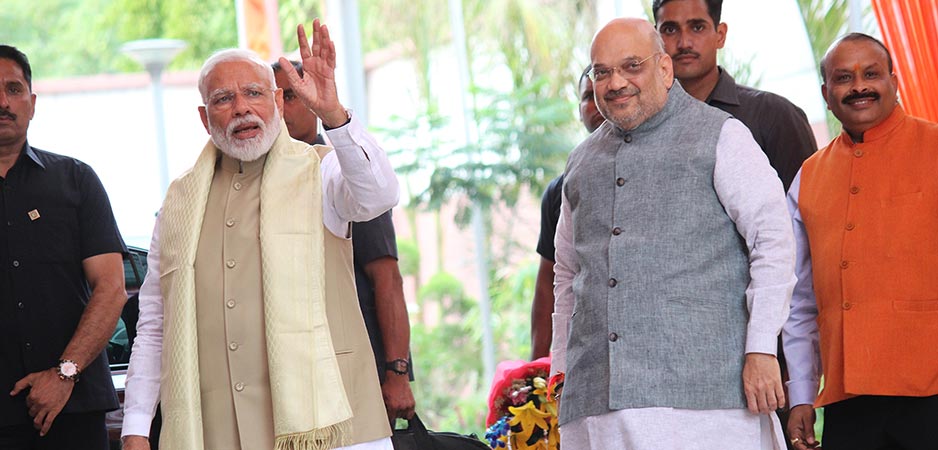Despite Indian Prime Minister Narendra Modi’s resoundingly successful reelection earlier this year, Foreign Policy magazine expresses serious doubts about his ability to keep the promises he made during his initial election campaign and hold the unwieldy nation together. His promises of economic progress not only remain unfulfilled, but India’s economy has witnessed a significant downturn during his time in office, and things are now taking a turn for the worse.
Modi’s clever campaign strategy diverted the voters’ focus toward his larger-than-life personality while playing dangerously with growing nationalist and populist sentiments among the Hindu majority. He projected an image of strong-man leadership that even non-militant Hindus are ready to admire. This has permitted him to reinforce his political power both in the national government and across a majority of states. Like Donald Trump in the US and Rodrigo Duterte in the Philippines, Modi has a keen sense of how to exploit the contemporary mechanics of democracy by turning an election into a popularity contest that typically rewards powerful personalities.
Like Emmanuel Macron in France, who came out of nowhere in 2017 to profit from the self-annihilating tendencies of the two dominant parties that had controlled the state for nearly 60 years, Modi can also thank the continuing ineptitude of the traditionally dominant Congress party leaders for paving his way to electoral victory and now an easy consolidation of his power over the world’s largest democracy.
Modi has thus avoided the plight traditionally forecast in a democracy for political leaders who fail to produce strong economic results. Most observers believe they will be punished by the electors. Indeed, many pundits predicted Modi’s defeat in this year’s election for that very reason. But Modi managed to compensate for the failures of a flagging economy by imposing his personality and stoking the belief that, through sheer will and personal strength, he could set India on the right track.
Milan Vaishnav, the author of the Foreign Policy article, delves into the complexity of Modi’s performance, his decisions and the current trends. He finally aligns with the traditional wisdom in predicting a backlash as soon as Indians realize that the economy is in the doldrums and Modi lacks a magic wand.
Modi has managed to square the circle by simultaneously adopting a manifestly liberal economic approach that contrasts with the socialist tradition established by the Congress party, while also playing to his Hindutva base that sees the national identity closely linked to the Hindu religion and has consistently shown that it is “highly suspicious of liberalizing economic reform.” Vaishnav warns that, while “setting its economic agenda, the [ruling Bharatiya Janata Party] has to be careful not to alienate the Hindu nationalist base that has powered its electoral triumphs.”
Here is today’s 3D definition:
Alienate:
Create a bad impression by revealing a truth that, so long as it remains concealed or effectively disguised, will ensure the loyalty of those who would object to that truth
Contextual Note
Narendra Modi is hardly unique in adopting a strategy designed for a solid base of voters who are not necessarily representative of the nation and whose interests do not necessarily coincide with the economic interests of the nation as a whole. Donald Trump applied this strategy in the US to win the presidential election in 2016.
The secret to success lies in deciding which segments of the population the candidate accepts to alienate. If Modi’s minority Hindutva base in India — or the nationalist and racist base of Trump in the US — is powerful enough to provide the energy for a successful campaign, alienating an identifiable minority that most voters don’t care enough about can be a winning strategy. In an increasingly unstable geopolitical landscape, politicians can count on the passive sense of nationalism felt by the undefined and politically unmotivated mass of voters concerned primarily by their own survival and prosperity.
With both Modi and Trump, the effort to appease the base, to ensure that it will not be alienated becomes a major strategic goal. Modi can thus play on the Hindu majority’s hostility toward a Muslim minority and even initiate dangerous geopolitical actions such as removing Kashmir’s autonomy. He can do this because he knows it will galvanize a base that may find his other policies, such as his embrace of free trade, objectionable.
Unlike the top-down Congress, Modi’s party, the Bharatiya Janata Party (BJP), draws its force and energy from grassroots groups, one of which “has regularly lobbied the government to limit foreign trade, curb foreign direct investment, and abandon the privatization of the public sector.” That hasn’t stopped Modi from pushing all of those policies to please his urban middle-class constituency, a group that feels little sympathy with his base and vociferously applauds what it sees as his liberalizing reforms.
In the same way, Trump has never missed an opportunity to highlight his sympathy with the racist sentiments of his base of lower-middle-class white voters while promoting an economic policy that clearly favors the rich and a foreign policy that, in theory, appears to be less aggressive toward other nations and races.
In the article, Vaishnav remarks that Modi’s contradictory behavior produces policy initiatives that give him “an air of indecision and equivocating.” Vaishnav assumes that, at some point, there will be a backlash on one side or the other. He may be forgetting that some strong politicians have an uncanny way of making equivocation prosper, often for quite a long time.
Historical note
Modi, Trump, Duterte, Jair Bolsonaro in Brazil and, to some extent (at least in the short term), Boris Johnson in the UK reflect a somewhat surprising trend that has worrying similarities with the situation in Europe between the two world wars. Strong-arm leaders — who carefully study whom to avoid alienating while having no bones about humiliating and marginalizing particular minorities — rise to power not by converting the nation to their extremist views, but by exploiting the passive complicity of a not very galvanized and often disparate majority, impatient with the stagnancy bred by bureaucracy and willing to bet on the bold decision-making of politicians who vaunt their strength and cultivate their narcissism. Aided by the power of electronic media, voters easily confuse blatant narcissism with charisma.
Such leaders often come to power as a result of a vague sentiment of disgust the population feels toward what is perceived as the corruption of the existing ruling class. Typically, these rising leaders claim to eliminate corruption, to “drain the swamp,” as Trump repeatedly insisted.
According to Vaishnav, Modi defeated his rivals in 2014 because of Indians’ perception that “the Congress party had mismanaged the economy, fallen into paralysis, and faced one major corruption scandal after another.” Brazil has seen the banal, minor and fundamentally ambiguous corruption of Dilma Rousseff’s Workers’ Party government replaced first by Michel Temer’s far more aggressively corrupt government after her impeachment in 2016 and then by Bolsonaro, elected in 2018, whose close association with the criminal class, including death squads, neatly accompanies his own taste for well-structured corruption.
In reality, corruption can be seen as an inevitable feature of any political system that puts money at the center of its value system, which of course is the working principle of any capitalist economy. It’s just a question of where corruption lurks, what laws and customs it hides behind and how well it disguises itself. Where money rules, corruption becomes an everyday work tool.
Earlier this year, Forbes assessed Modi’s progress in fighting corruption and concluded: “Modi’s government has been fighting corruption in the wrong places, among the country’s poor. And it has left corruption thriving in the high places, among the country’s rich.” That represents a trend among strong-arm leaders who absolutely need to buy off the most powerful interest groups in their nation just to stay in power. They may even boast about the patriotism of supporting the rich and powerful. The easiest victims of anti-corruption reforms are the poor, many of whom have no choice but to find shortcuts for survival, among which are favors, dodges and subterfuges that can be designated as corruption.
In brief, strong political leaders now seek to alienate those they don’t need and protect from alienation those they depend on both for their financing and the energy required to mobilize for their election campaigns. Though Modi leads a nation with a population that is several times the world’s largest democracy, he is just one in a growing cast of talented performers skilled in the art of selective alienation.
*[In the age of Oscar Wilde and Mark Twain, another American wit, the journalist Ambrose Bierce, produced a series of satirical definitions of commonly used terms, throwing light on their hidden meanings in real discourse. Bierce eventually collected and published them as a book, The Devil’s Dictionary, in 1911. We have shamelessly appropriated his title in the interest of continuing his wholesome pedagogical effort to enlighten generations of readers of the news.]
The views expressed in this article are the author’s own and do not necessarily reflect Fair Observer’s editorial policy.
Support Fair Observer
We rely on your support for our independence, diversity and quality.
For more than 10 years, Fair Observer has been free, fair and independent. No billionaire owns us, no advertisers control us. We are a reader-supported nonprofit. Unlike many other publications, we keep our content free for readers regardless of where they live or whether they can afford to pay. We have no paywalls and no ads.
In the post-truth era of fake news, echo chambers and filter bubbles, we publish a plurality of perspectives from around the world. Anyone can publish with us, but everyone goes through a rigorous editorial process. So, you get fact-checked, well-reasoned content instead of noise.
We publish 2,500+ voices from 90+ countries. We also conduct education and training programs
on subjects ranging from digital media and journalism to writing and critical thinking. This
doesn’t come cheap. Servers, editors, trainers and web developers cost
money.
Please consider supporting us on a regular basis as a recurring donor or a
sustaining member.
Will you support FO’s journalism?
We rely on your support for our independence, diversity and quality.






